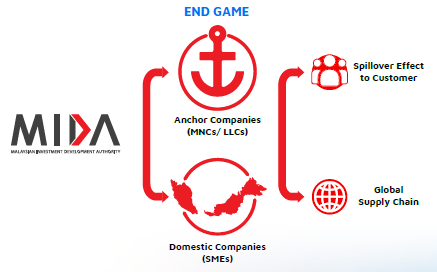
This site
is mobile
responsive

The COVID-19 pandemic posed one of the most challenging periods in recent history with the widespread reach of the virus globally leading to both health and economic crisis.
As a measure to mitigate the accelerated spread of the virus, governments globally imposed a total or partial lock-down that limited the movement of people and vehicles. This fundamentally transformed the global supply chain, with periodic shutdowns, rise of import restrictions, among governments globally, panic buying of household/critical items and unprecedented demands for medical equipment/materials, and pharmaceutical ingredients, disrupting the global value chain.
Malaysia, as one of the integral parts of the global supply chain was not spared in facing this disruption but managed to leverage the strengths of its local value chain to fortify the country’s supply chain resilience in delivering critical goods.
As the national investment promotion agency of Malaysia, it is imperative for the Malaysian Investment Development Authority (MIDA) to dampen the impacts of this global disruption while reducing Malaysia’s local supply chain’s exposure to geopolitical or natural-disaster risk.
MIDA’s theme this year, encapsulates this: “Rebuilding a sustainable economy through quality investment and strategic investment supply chain development in 2022”. In line with this theme, MIDA continues to intensify its efforts to secure sustainable investments from both domestic and foreign investors by providing comprehensive and competitive investment incentives and facilitation.
The Government of Malaysia, through MIDA, initiated the supply chain facilitation programme to assist both domestic and foreign companies to address global supply chain disruptions.
MIDA’s supply chain programme aims to create opportunities for domestic companies, narrow gaps in the supply chain caused by the pandemic, support multinational companies (MNCs) and Limited Liability Companies (LLCs) in outsourcing their manufacturing activities to domestic companies, develop and upgrade the domestic companies for the growth of domestic investments and encourage the adoption of automation and 4IR by MNCs, LLCs and their vendors.
Through the local sourcing facilitation, MIDA assists MNCs and industry players by connecting anchor companies to local suppliers and potential vendors through business-matching sessions. Some of the notable MNCs that have been benefited from this facilitation by MIDA include II-VI Incorporated (formerly known as Finisar), Bromma Malaysia, Jabil Circuit, Hovid Bhd, Camel Power (M), Smiths Detection Malaysia, Sternmaid Asia Pacific, Molex Malaysia, Dexcom (Malaysia) and Ultimate Machining Solutions (M).
To further accelerate the development of Malaysia’s local value chain, MIDA proactively engages with the MNCs/LLCs anchor companies to assist them in upgrading their local vendors via talent upskilling, technology adoption, incentives, and other financial assistance through MIDA’s vendor facilitation programme. Anchor companies that have benefited from MIDA’s vendor facilitation programme include Perodua, BASF Malaysia, and First Solar.
Additionally, MIDA periodically organises MNCs/LLCs and domestic companies by organising supply chain conference with selected anchor companies (among 2022 anchors include: AT&S and VAT Manufacturing Malaysia). The purpose of this conference is to create greater spillover benefits from MNCs and LLCs to the local business community.
These initiatives augur well with the Twelfth Malaysia Plan or 12MP (2021 – 2025) that seeks to enhance supply chain sustainability towards ensuring uninterrupted supply of goods and services. Ultimately, MIDA’s initiatives will contribute towards building the capabilities of Malaysian companies to be part of the global supply chain, which aligns with the National Investment Aspirations (NIA) have focuses on extending domestic linkages.
Companies that are interested to participate in MIDA’s various supply chain facilitation initiatives are welcome to touch base with the supply chain team from Domestic Investment Division of MIDA.


Newsletter March 2022